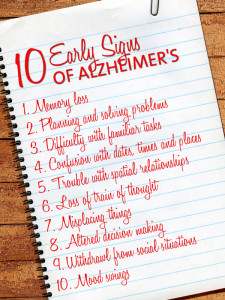Early diagnosis is extremely crucial with Alzheimer’s. The sooner you know you mayhave Alzheimer’s the more time you have to take advantage of all the treatment opportunities
available. It also gives you and your family time to know and understand the disease and enables you to plan for the future. With that said, the Alzheimer’s Association is a wonderful resource to use when researching information about Alzheimer’s, including the brain science behind it, doctors visits, as well as early signs and symptoms of Alzheimer’s. Below is the list of signs and symptoms to look for when addressing the
possibility of Alzheimer’s.

- Memory loss is one of the most common and early signs of Alzheimer’s. As we age, we all feel the wrath of memory loss, so do not feel as if this is always related to Alzheimer’s. The difference of Alzheimer’s type memory loss is you will notice it disrupting your daily life in many ways. For example, you may start to forget common information, requiring you to ask for this over and over again. You may start to rely more on memory aides such as notes and those around you.
- Planning and solving problems may become difficult for a person who potentially has Alzheimer’s. Tasks such as balancing a checkbook, following a recipe, or developing a plan may become more difficult.
- Difficulty with familiar tasks becomes apparent. For example, needing assistance using the oven or driving to a familiar place are crucial signs of early memory loss.
- Confusion with dates, times, and places becomes a problem. Knowing simple information like time of day and date is a very common Alzheimer’s symptom.
- You may begin to have trouble with visual images and spatial relationships. Color contrasts, judging distances, as well as simply reading may become difficult.
- You may notice yourself stopping in the middle of conversation to find the right word to use or to gather your thoughts. If this seems to become a habit and more disruptive than usual, it may be a sign of early Alzheimer’s.
- Misplacing things and not being able to retrace your steps is another sign of early Alzheimer’s.
- Your judgement when making a decision may become altered. For example, when dealing with money or addressing someone that needs information from you, such as when purchasing something.
- Many times, all the symptoms above will cause those at risk of Alzheimer’s to withdrawal from social situations. In itself, this can be an early sign.
- In addition, mood changes will become apparent.
As a disclaimer, all the symptoms above can be signs of something else other than Alzheimer’s or possibly simple brain inactivity that some experience without an underlying cause.
However, if you start to feel that any of these signs disrupt your daily life, it is imperative that you see a doctor to find out if the prognosis may possibly be Alzheimer’s. Also, educate yourself. The more you know about Alzheimer’s , the better you will be able to understand your treatment options.
